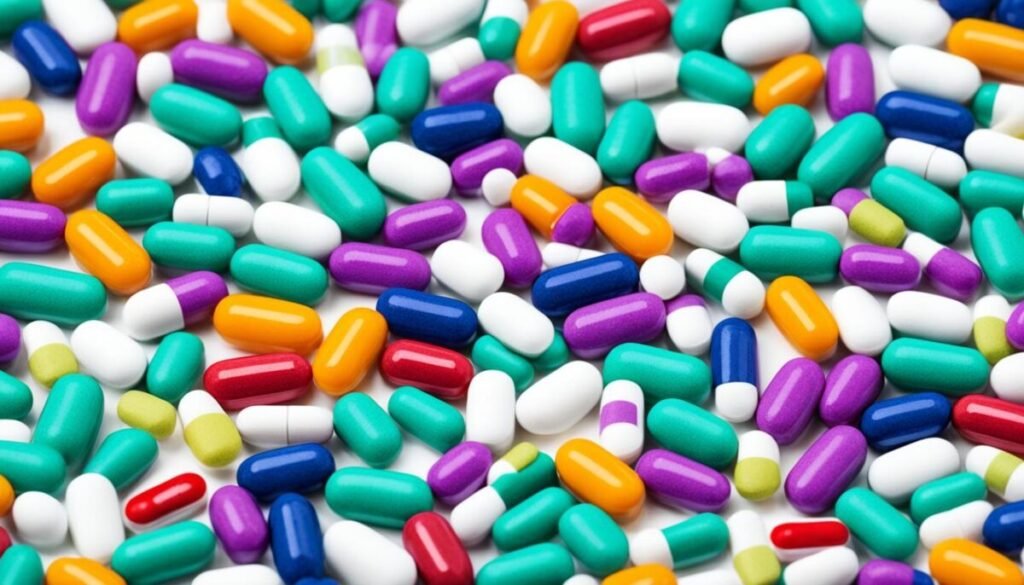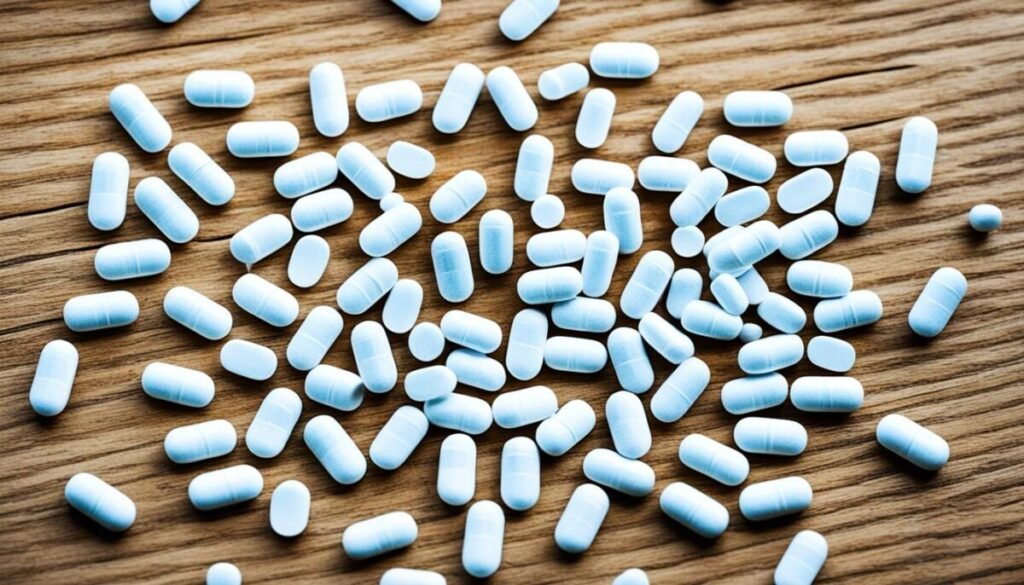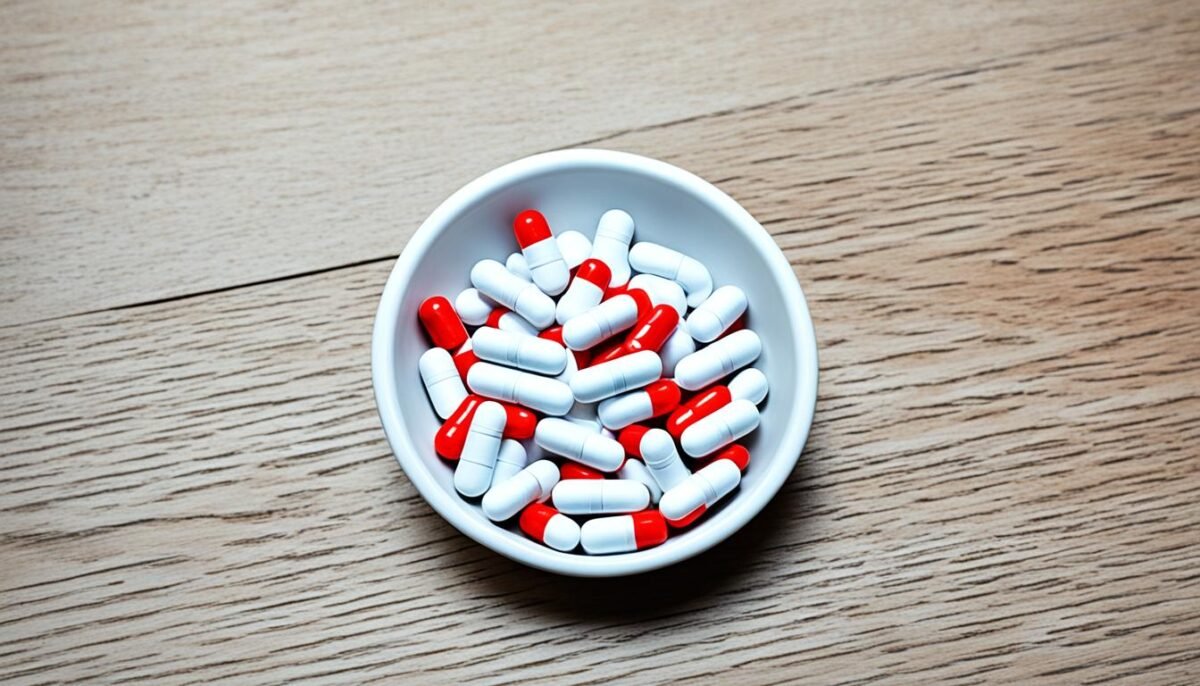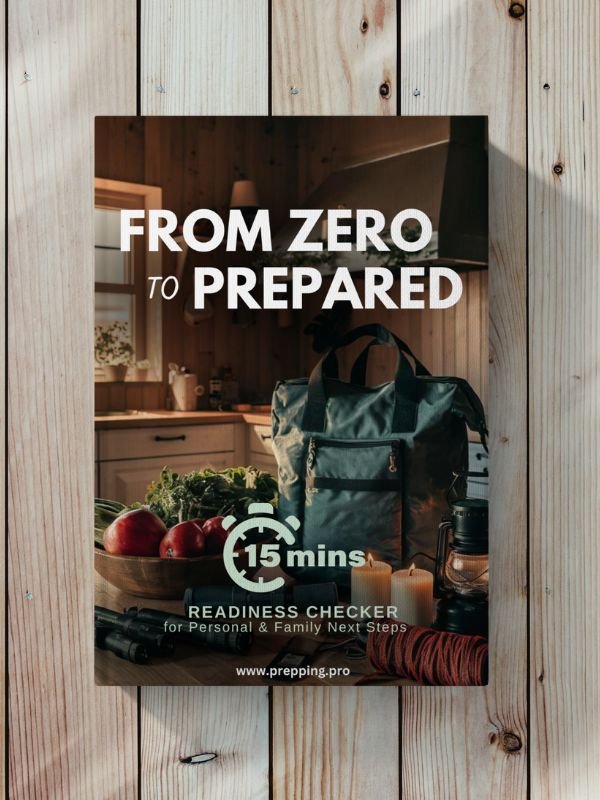There’s comfort in knowing that even in the midst of crisis, I can provide a self-care drug emergency response to myself and my loved ones.
It’s not just about surviving, it’s about thriving by being proactive, taking control and being prepared.
In this article, we will discuss essential over-the-counter medications that everyone should stock in their home emergency kit.
Key Takeaways
- Over-the-counter medication emergency kits are crucial for personal resilience and preparedness during health emergencies.
- A well-stocked kit should include a variety of drugs to manage conditions like pain, allergies, digestive issues, and skin problems.
- Regular monitoring of your emergency kit to replace expired items and cater to evolving health needs is wise.
- Over-the-counter medication readiness extends to the workplace and vehicle, not just at home.
- Educate yourself about the right usage and potential side effects of over-the-counter drugs
- Timely and effective self-care drug emergency response can reduce discomfort and improve health outcomes.
Imagine this, a power outage hits, causing chaos in the neighborhood.
Stores are closed, your trusted pharmacy is inaccessible, and you desperately need medication to quell the pain from a throbbing headache, allergy run or sudden on-set fever. It’s a non-prescription drug emergency situation, a convenience store medicine crisis.
It’s moments like these when you realize the sheer importance of being prepared with an over-the-counter medication emergency kit.
As an American, I’ve experienced firsthand how life throws curveballs we can’t anticipate. From natural disasters to unexpected health hiccups, emergencies happen. During such times, every second counts.
The need for a pharmacy medication quick remedy is now!
Table of Contents
Pain Relief

In the landscape of a self-care drug emergency response, having a variety of pain relief options available becomes vital.
Medical professionals often stress the importance of keeping multiple forms of over-the-counter pain relievers in your medicine cabinet to address varying types of pain.
Dealing with off-the-shelf medication critical need, two non-prescription drugs stand out as pivotal for addressing unexpected pain during an emergency.
1. Ibuprofen (Advil, Motrin)
Ibuprofen, a non-steroidal anti-inflammatory drug (NSAID), holds a place of importance. Known for its efficacy in reducing inflammation and different types of pain, it serves as an ideal solution for sudden muscular or joint aches and even fever.
2. Acetaminophen (Tylenol)
On the other hand, Acetaminophen, often mistaken for an NSAID, is yet another effective tool in any pharmacy medication quick remedy kit. Not only is it an excellent reliever for pain, but it also helps in fever reduction.
Both Advil (ibuprofen) and Tylenol (acetaminophen) prove to be indispensable in your emergency kit, especially when the need for immediate relief from discomfort or pain arises.
Allergies
When it comes to emergency preparation, it’s crucial to keep in mind the unpredictability of allergies. At any given moment, they can flare-up, triggering uncomfortable and, in some cases, life-threatening reactions.
That’s why having antihistamines in your emergency kit is a non-negotiable.
These essential pharmacy medication quick remedies work by blocking the release of histamines—the substances our bodies produce during an allergic reaction.
By doing so, they can effectively alleviate the distressing symptoms caused by allergens such as pollen, dust, and pet dander. Here are a couple of over-the-counter antihistamines you might want to consider:

3. Loratadine (Claritin)
Loratadine, the active ingredient in Claritin, is a popular choice for its non-sedative properties. Unlike some antihistamines, it doesn’t induce sleepiness, making it the perfect self-care drug emergency response for daytime use. It’s also long-acting, providing up to 24 hours of relief.
4. Diphenhydramine (Benadryl)
On the other end of the spectrum is Diphenhydramine, found in Benadryl. This antihistamine is known for its sedative effects, which can assist in providing a good night’s sleep. Given its ability to induce drowsiness, it’s often recommended for nighttime usage.
When combined, Loratadine and Diphenhydramine form a comprehensive allergy management strategy.
One keeps your symptoms in check during daytime hours while the other helps you rest comfortably at night.
Remember, preparation is key when dealing with allergic reactions. So, don’t wait for symptoms to show up before adding these antihistamines to your emergency drug supply.
Digestive Issues
Amid moments of urgency and unforeseen circumstances, we face the likelihood of disruptive digestive issues.
In times of crisis, reliable nonprescription remedies become invaluable, providing immediate relief from bouts of stomach discomfort.
Key over-the-counter medications have proven competent in tackling an array of digestive disturbances, ensuring that we remain capable and unfazed during such critical times. Let’s review some of these helpful aids.
5. Loperamide (Imodium)
When an urgent situation arises, diarrhea is a discomfort we’d rather be without. Loperamide, widely known by its brand name, Imodium, offers timely respite from loose bowel movements.
6. Bismuth Subsalicylate (Pepto-Bismol)
Versatility is crucial when selecting medicines for your convenience store emergency pill stash. The active ingredient in Pepto-Bismol, Bismuth subsalicylate, is a reliable ally that effectively combats nausea and general stomach upset.
7. Famotidine (Pepcid)
Acid reflux and heartburn are common maladies that have a knack for appearing at the most inconvenient times.
For these instances, Famotidine—the active compound in Pepcid—is your go-to relief operation, neutralizing stomach acid and providing immediate relief.
In conclusion, don’t let digestive discomfort ruin your day.
With these off-the-shelf medication options in our toolkit, you can deal with these common inconveniences confidently and proactively, even when a doctor’s visit isn’t an immediate option.
Understanding Over-the-Counter Medication Emergencies
An over-the-counter medication emergency can arise in situations where there is an immediate need for medical treatment, but professional help is not within reach.
You must become your own self-care drug emergency response. This proactive measure can alleviate discomfort and prevent minor ailments from escalating into severe health concerns.
8. Hydrocortisone Cream
Hydrocortisone cream is a go-to treatment for a variety of skin conditions. Its characteristics make it an essential part of any emergency kit. This topical ointment considerably reduces itching and inflammation stemming from rashes, eczema, insect bites, and even minor chemical burns. It offers immediate relief, allowing individuals to manage skin discomfort independently during a non-prescription drug emergency situation.
9. Aloe Vera Gel
Another fundamental item in an over-the-counter medication emergency kit is Aloe Vera Gel. Known for its natural soothing and cooling properties, this gel plays a vital role in providing immediate relief from minor burns, sunburns, and other skin irritations. Furthermore, consistent application promotes faster healing and minimizes skin damage, proving its worth in an effective self-care drug emergency response framework.
Cold and Flu
Cold and flu symptoms can abruptly interrupt our normal routines, more so in the midst of an emergency situation.
Acquiring the necessary OTC medications from a convenience store can escalate into a medicine crisis during such times.
Preventing such pitfalls is vital, which is where the importance of having a pre-organized supply of cold and flu remedies comes into play.
10. Pseudoephedrine (Sudafed)
Pseudoephedrine, commonly found in Sudafed, is an essential inclusion in your emergent care kit. This non-prescription drug offers significant relief from nasal congestion, a common symptom during a cold or flu. It will serve as a much-needed quick remedy in a sudden health situation.
11. Dextromethorphan (Robitussin, Delsym)
Dextromethorphan, the active ingredient in Robitussin and Delsym, is another over-the-counter drug that proves essential during a medication emergency. Acting as a cough suppressant, it provides relief from persistent coughs and allows you to stay functional amid health-related interruptions.
12. Guaifenesin (Mucinex)
In your quest to stay prepared for a pharmacy-level emergency, do not overlook the importance of a basic expectorant like Guaifenesin, found in Mucinex. Exceptionally effective in loosening chest congestion, its inclusion can make a noticeable difference to your comfort level during a cold or flu situation.
| Medication | Brand | Use |
|---|---|---|
| Pseudoephedrine | Sudafed | Nasal Congestion Relief |
| Dextromethorphan | Robitussin, Delsym | Cough Suppression |
| Guaifenesin | Mucinex | Chest Congestion Relief |
In summary, proactively including these medications to your arsenal can transform a potential convenience store medicine crisis into an efficiently managed non-prescription drug emergency situation.
They promise convenience, ensuring that even when timely access to a pharmacy isn’t possible, prompt relief from cold and flu symptoms is within your reach.
Women’s Health
In emergencies, women’s health needs can often be overlooked, especially when it comes to menstrual discomfort and pain.
These issues can significantly impact women’s ability to cope effectively during stressful situations.
Consequently, having access to a robust and efficient self-care drug emergency response becomes highly essential.

13. Ibuprofen (Advil, Motrin) – For menstrual cramps
First on the list is Ibuprofen. Available under brand names Advil and Motrin, this non-prescription drug is often utilized for alleviating menstrual cramps. Its anti-inflammatory and pain-relieving properties make it a popular and effective choice, particularly during emergencies when professional medical help is not immediately available. Having a bottle of Ibuprofen in your medicine kit can offer an immediate and effective pharmacy medication quick remedy to handle menstrual cramps effectively.
14. Naproxen (Aleve) – For menstrual pain
Another over-the-counter medication that’s beneficial for women’s health emergencies is Naproxen—commonly known under the brand name, Aleve. This medication is a potent choice for reducing menstrual pain and discomfort, offering women quick pain relief when they need it the most. Similar to Ibuprofen, quick access to Naproxen during an emergency can substantially minimize the adverse effects of menstrual symptoms, thereby enabling women to manage crises more effectively.
| Advil (Ibuprofen) | Aleve (Naproxen) | |
|---|---|---|
| Usage | Relieves menstrual cramps | Reduces menstrual pain |
| Benefits | Offers anti-inflammatory and pain-relieving properties | Provides quick pain relief during emergencies |
| Considerations | Always follow the recommended dosage | Not to be used in conjunction with other NSAIDs |
To conclude, over-the-counter medication emergencies can arise anytime, anywhere, and being equipped to handle them properly is a significant part of crisis management.
Regularly stocking and updating your medication kit with essential drugs like Ibuprofen and Naproxen ensures you’re always prepared to manage and overcome an unexpected health crisis effectively.
Skin Care
In the midst of an over-the-counter medication emergency, it’s crucial not only to prioritize internal health concerns but also to mindfully attend to external bodily needs, primarily involving skin care.
This becomes especially prevalent during prolonged emergencies where regular hygiene and skin care habits might be affected.
Ensuring a comprehensive skin care regimen in such instances can assist in mitigating potential skin crises.
Common Medication Needs in Crisis Times
When anticipating a nonprescription remedy urgent situation, some common skin care needs to consider include protection against environmental factors, ability to manage minor injuries and maintaining overall skin health.
Regularly used products in our daily routines might not be available or practical to use during emergencies. Hence, it’s advisable to have simple, multi-use products in your emergency kit.
Anticipating Non-Prescription Drug Emergencies
To ward off potential skin issues during emergencies, some effective over-the-counter solutions are micellar water and ointment sprays.
Micellar water caters to facial cleanliness, providing easy and gentle makeup removal without the need for excess water or a sink.
On the other hand, ointment sprays can serve as quick moisture providers for dry skin patches.
Benefits of Over-the-Counter Medications in Emergency Kits
Pharmacy medication quick remedies in your emergency kit should also include sun protection, as unexpected prolonged exposure to sun can lead to sunburns or intermittent skin damage.
A practical option to consider is powdered sunscreen which can be reapplied throughout the day for continuous sun protection. This is particularly beneficial during outdoor emergencies where finding shelter might be a challenge.
Hence, incorporating such versatile skin care items in your emergency kit is not merely a proactive step, but a necessary one to secure long-term skin health during crises. Remember, having a well-prepared emergency kit today can save you from a world of trouble tomorrow.
Essential Pain Relievers for Your Emergency Kit
In times of crises like a convenience store medicine crisis, it’s crucial to have an emergency kit stocked with suitable treatments.
This cornerstones of the kit are the pain relievers, as they aid in addressing various discomforts from minor headaches to severe muscular aches.
Pain relievers hold a prominent place in any emergency kit due to their versatility and capacity for providing immediate comfort.
Amidst an off-the-shelf medication critical need, it’s mandatory to have these medications at hand to aid in prompt relief.
“Pain relievers are life-savers during a crisis. They provide immediate relief and help maintain a positive and calm mindset, a necessity in an emergency situation.”
| Type | Examples | Uses |
|---|---|---|
| Oral Pain Relievers | Nonsteroidal anti-inflammatory drugs (NSAIDs) | Headaches, body aches, fevers, inflammation |
| Topical Pain Relievers | Lidocaine patches, Diclofenac gel | Muscle aches, joint pain, backaches |
Pain relievers, both oral and topical, available over-the-counter, act as reliable allies in managing pain during an emergency.
They come in handy to provide localized relief in different types of bodily discomforts during a self-care drug emergency response.
- Nonsteroidal anti-inflammatory drugs (NSAIDs): Most commonly used oral pain relievers to reduce inflammation and pain.
- Lidocaine patches: Provide topical numbing relief to soothe specific pain areas on the body.
- Diclofenac gel: This topical analgesic treats joint pain in hands, wrists, elbows, knees, ankles, or feet caused by osteoarthritis.
In times of crisis, these pain relievers can be invaluable assets in managing discomfort and maintaining mental calm.
Always remember, a well-stocked emergency kit serves as a safeguard against unforeseen health disturbances.
The Role of Allergy Medications in Emergency Preparedness
Emergencies may be unpredictable, but that doesn’t mean we can’t take steps to better prepare ourselves.
One important area of emergency readiness is ensuring the provision of essential medications for critical conditions— and among these, allergy medications hold a significant place.
Allergic reactions can surface unexpectedly and can be, in some cases, life-threatening, making the inclusion of effective allergy medications in your emergency preparedness kit absolutely crucial.
Antihistamines: Your Defense Against Unexpected Allergies
Antihistamines, available over-the-counter, serve as frontline defense against symptoms of allergies. Symptoms like sneezing, itching, and nasal congestion can chip away at your comfort during challenging times.
Efficient pharmacy medication can serve as a quick remedy in such situations. Brands like Claritin, Benadryl, and Xyzal are a few household names that offer a variety of options for immediate and sustained relief.
Importance of Having Standby OTC Allergy Relief
In a non-prescription drug emergency situation, having standby allergy relief medications in your kit can prove to be a lifesaver.
Not only do these medications provide critical relief from distressing symptoms, but they can also prevent allergic reactions from escalating further, thereby reducing the risk of a small discomfort turning into a grave medical concern.
Being smart about self-care and having an effective drug emergency response strategy ensures that you have the tools required to deal with an unpredictable situation. Remember, the key is to stay prepared so you can tackle any health concern that may arise during an emergency.
Digestive Aids: Over-the-Counter Medication Emergency Essentials
In the event of an over-the-counter medication emergency, a well-stocked medicine cabinet is indispensable.
Of particular importance are remedies for unexpected digestive ailments.
Whether caused by stress, diet changes, or illness, these issues are notably distressing, particularly in a convenience store medicine crisis.
Antacids and Anti-Diarrhea: Managing Digestive Disorders During Crises
Antacids function as a quick, over-the-counter solution for heartburn relief, neutralizing stomach acid and providing immediate comfort.
Essential for any emergency kit, antacids help manage an unexpected heartburn flare-up, often a result of stress or diet alteration during critical situations.
Similarly, anti-diarrhea treatments like Imodium are vital.
Unexpected incidences of diarrhea can be dangerous if not promptly addressed, leading to dehydration and further distress. Anti-diarrhea medications slow down the digestive system, allowing the body to absorb more liquid and reduce the symptoms of diarrhea.
- Antacids: Neutralize stomach acid to provide immediate heartburn relief.
- Anti-Diarrhea Treatments (Imodium): Slow the digestive system to reduce diarrhea symptoms.
Bismuth Subsalicylate and its Role in a Quick Remedy Kit
Beyond antacids and anti-diarrhea treatments, Bismuth Subsalicylate holds a central place in a well-stocked emergency kit. Serving as the active ingredient in Pepto-Bismol, it tackles multiple symptoms from nausea to an upset stomach.
Notably effective in a nonprescription remedy urgent situation, it minimizes discomfort and aids in faster recovery from digestive issues.
In conclusion, a crisis often presents many unknowns, but one’s ability to manage health issues should not be one of them.
Ensuring ready access to critical over-the-counter medications in an emergency promotes comfort and confidence in navigating any sudden health disruptions, particularly those tied to our digestive system.
Conclusion
As we conclude our guide on over-the-counter medication emergency preparedness, it’s evident that proper planning equips us to handle a spectrum of health-related surprises, from pain and allergies to digestive issues and skin care, with confidence.
Prioritizing our health, especially during emergencies, relies on the prudence and foresight of having a well-stocked kit.
Efficiency in facing an over-the-counter medication emergency or pharmacy medication quick remedy situation begins with personalizing the kit to the unique needs of ourselves and our loved ones, including pets.
Continuously updating and maintaining its accessibility is as important as having one. This is because timely responses are critical in these unexpected circumstances, often making a significant difference in outcomes.
Whether it’s a self-care drug emergency response or an everyday health hiccup, readiness is the key.


